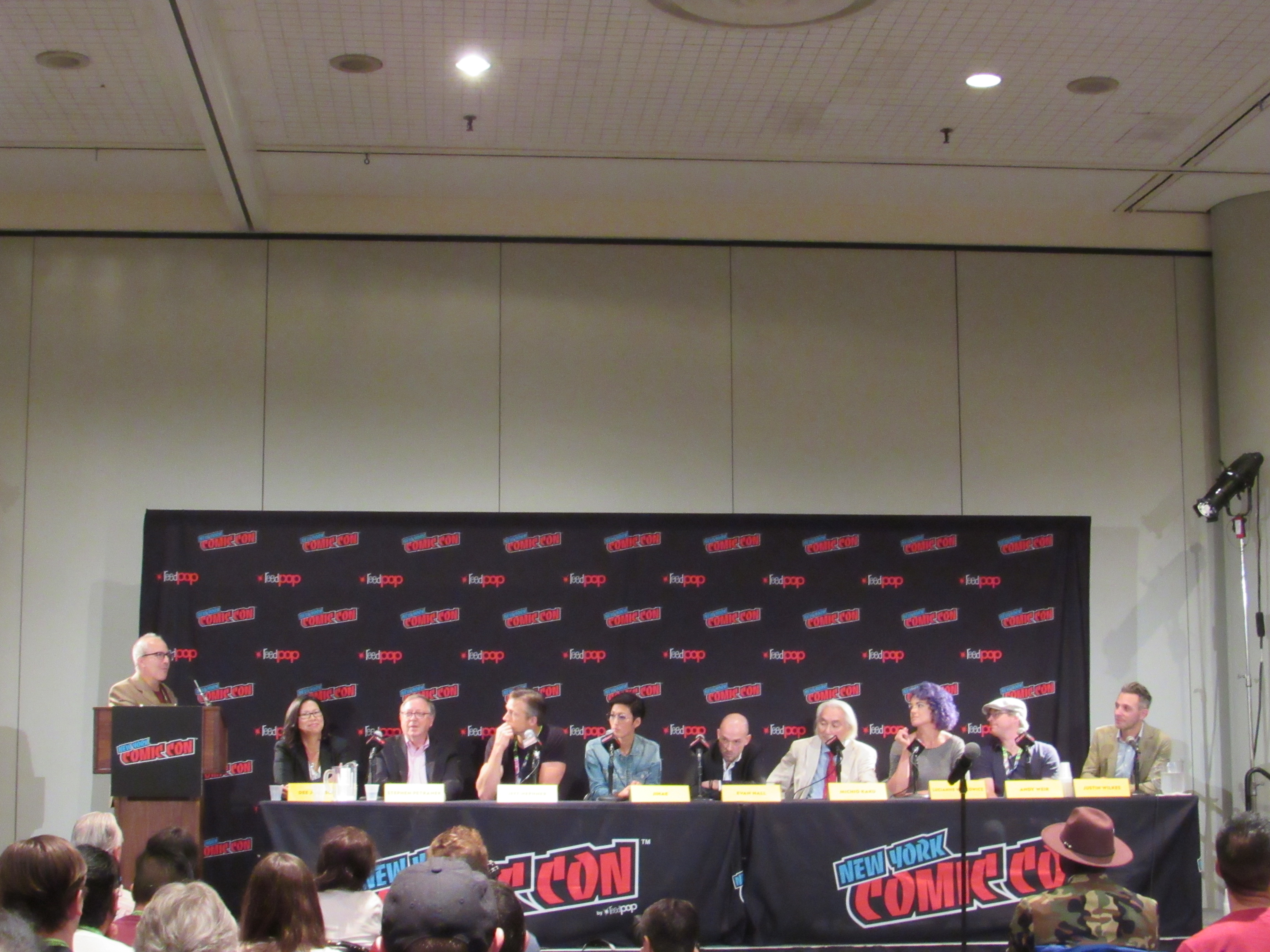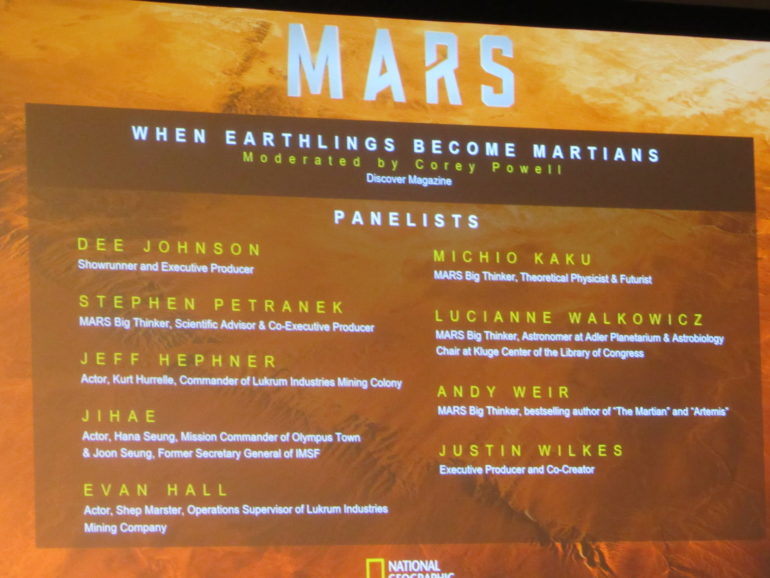National Geographic’s Mars, Season 2 panel took place at New York Comic Con on Thursday, October 4, 2018 in Room 1A10 at the Javits Center 3:00pm-4:00pm. This fit in nicely with our schedule, as we were able to walk right over from the David Boreanez panel which had just finished up a few minutes before.
The Mars panel included Showrunner and Executive Producer Dee Johnson, Scientific Advisor and Co-Executive Producer Stephen Petranek, Executive Producer and Co-Creator Justin Wilkes, and actors Jeff Hephner (Kurt), Jihae (Hana), and Evan Hall (Shep). Additionally, the panel featured experts from the scientific community, including Theoretical Physicist and Futurist Michio Kaku, Astronomer and Astrobiologist Lucianne Walkowicz, and Andy Weir, author of The Martian.

We learned that Season 2 of Mars will be about the science side versus the business side of things. What’s different this season is that last season it was only one colony on Mars, all from the same organization, but in Season 2 a new group shows up with a very different agenda, from a private enterprise, and we’ll see what it’s like to share the planet with this other group.
Stephen Petranek addressed the question of why go to Mars in the first place? He pointed out that at some point, something may happen to the Earth to cause humans to become extinct, like it did with the dinosaurs, and that if we do not become a space-faring species, we will not exist forever. Therefore, if we establish self-sustaining colonies on Mars, it will provide two large concentrations of people, and increase our chances of survival. In his opinion, it’s a good idea to get off the planet as soon as possible and explore what we can do.
Michio Kaku (whom we have actually seen speak before, at Silicon Valley Comic Con 2018) chimed in, saying that when people ask him the question of why go to Mars, he tells them that the dinosaurs didn’t have a space program, and that’s why they’re not here today. However, we do have a space program, which allows us to have an “insurance policy.” Kaku pointed out that “extinction is the norm,” but that we are different and can control our destiny. He also pointed out that it cost more to make a Hollywood movie about Mars (The Martian) than it actually costs to go to Mars: about $100 million vs. $70 million.
 The moderator asked the audience how many people would go to Mars if he offered them a ticket right now. Almost every hand went up. But then when he asked if it was only a one-way ticket, most of the hands dropped. He also asked this question of the panel.
The moderator asked the audience how many people would go to Mars if he offered them a ticket right now. Almost every hand went up. But then when he asked if it was only a one-way ticket, most of the hands dropped. He also asked this question of the panel.
Justin Wilkes recalled reading Stephen Petranek’s book prior to creating the show, and learning about the human race being doomed, but at the same time learning about Elon Musk and SpaceX trying to bring humans to Mars. This led to combining the science side and the drama into a television show. In Season 1, it was about how to balance documentary storytelling with scripted drama. For Season 2, they considered how can we take that further and explore the dynamics of how to live and co-habitate on Mars?
As for an actual timeline of when humans will get to Mars in real life, Andy Weir (who we saw speak at New York Comic Con 2017, although via Skype) mentioned that NASA has estimated the 2030s. However, due to its shrinking budget, Weir thinks that it’ll be more like the 2050s, because it’s so expensive to go to Mars. Meanwhile, he thinks private companies becoming involved will help drive the price down. Dee Johnson chimed in, saying that space has always been a “public/private partnership” and that federal funding has always been “fickle” with its involvement, so it’s just a matter of if we really want to do it.
Petranek disagreed with Weir’s estimate, pointing out that SpaceX’s sole mission statement is to build a self-sustaining colony of humans on Mars. Despite it costing around $35 billion to be able to do so, Petranek, who has spent time with Elon Musk, said that Musk is dedicated to landing humans on Mars before 2030. Petranek doesn’t think we should rely on NASA, as they do not have the budget to do it themselves.
For Lucianne Walkowicz, one of the main reasons to go to Mars is because we know it has a history of being similar to the Earth, in that there were oceans on its surface, which have now disappeared. However, there could still be life, or at least a history of life, under the surface. Kaku agreed that you can’t rule out the possibility that Mars may still have some form of life on it, as there is still much of Mars that we have yet to explore.
 The actors also spoke a little about their respective characters. Hephner’s character, Kurt, is new this season, as he is part of the new group that comes in. He acknowledged that his character acts on selfish reasons, but that he could bring it around and make you see why. Jihae said that being on the show has made her think about doing her part in the real world to help with long term change rather than immediate results. Johnson pointed out that one thing that the core characters consider is trying to understand the planet first before acting. Evan Hall responded to his character being a “don’t rock the boat” kind of guy, just following orders, saying that his character was just doing this as a job to make money and get back home.
The actors also spoke a little about their respective characters. Hephner’s character, Kurt, is new this season, as he is part of the new group that comes in. He acknowledged that his character acts on selfish reasons, but that he could bring it around and make you see why. Jihae said that being on the show has made her think about doing her part in the real world to help with long term change rather than immediate results. Johnson pointed out that one thing that the core characters consider is trying to understand the planet first before acting. Evan Hall responded to his character being a “don’t rock the boat” kind of guy, just following orders, saying that his character was just doing this as a job to make money and get back home.
Additionally, the show will also address how to handle law and order on Mars this season. Another topic that will be tackled is how to survive psychologically. On top of that, there will be the issue of Mars vs. Earth and who is in charge.
Audience members were also given the chance to ask questions.
One question brought up the reality that upon humans reaching Mars for the first time, we’ll likely see the first fatality on Mars, as they probably wouldn’t be coming back, and whether the public was ready for that. Micho Kaku pointed out that the public would be sufficiently informed in advance. Nevertheless, he added that he didn’t think it would actually be a one way ticket to Mars. Instead, he thinks that a robot ship would go to Mars ahead of the ship carrying humans, and it would collect needed elements from the surface of Mars, then the travelers would be able to use fuel from the robot ship to return.
 Another question was about possible alternative methods of propulsion to get to Mars. Kaku talked about ion thrusters but also brought up a controversial method: going nuclear, which would then only take us one month to get to Mars instead of 9 months.
Another question was about possible alternative methods of propulsion to get to Mars. Kaku talked about ion thrusters but also brought up a controversial method: going nuclear, which would then only take us one month to get to Mars instead of 9 months.
I really liked the approach that this panel took, including both cast and crew from the show, as well as great minds from the scientific community. If you watch Mars, you’ll know that this parallels the show, which goes back and forth between a dramatized storyline and interviews with real scientific experts. I’m glad I got the chance to see this panel, as I greatly enjoyed seeing the science fiction and real science come together in the first season, and am looking forward to watching Season 2 of Mars!
Mars Season 2 premieres Monday, November 12 on National Geographic.
You can view more of our photos from the Mars panel at NYCC 2018 below.






























